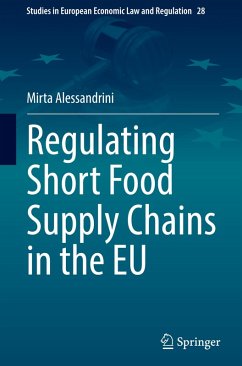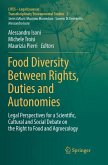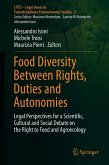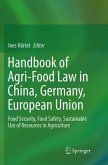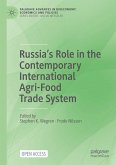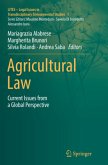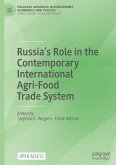This volume presents a thorough analysis of the concept and role of Short Food Supply Chains (SFSCs) within the EU legal framework with a two-fold aim: first, it shows the pitfalls of the current legal scenario, which often limits alternatives rather than promoting them, and second, it provides a new conceptualisation for SFSCs under EU law by delineating and integrating all their distinctive features.
Agricultural landscapes in the EU are now undergoing fundamental changes, revealing an increasing interest in SFSCs as a tool for promoting both local products and their food systems. Despite being the backbone of the EU agricultural system, SFSCs' position in the current socioeconomic narrative has not been sufficiently fostered. In response, the book traces how SFSCs have historically been dealt with under the agricultural rules of the CAP, and to a much lesser extent, those relating to internal market food law, delving into the intricate relationship between agricultural and food law.
The integration of these two disciplines into an agri-food law domain represented a pivotal shift in legal discourse, in particular in the context of SFSC regulation. The legal analysis extends its scope to encompass spatial and historical dimensions, enriching the contextual understanding of regulatory frameworks over time and across geographical boundaries.
This new conceptualisation does not aim to establish a universal, 'set-in-the-stone' legal definition for SFSC applicable across disciplines. Rather, it seeks to identify common themes and key features among various SFSC initiatives. These themes serve as the foundation for determining a set of minimum legal requirements for the recognition and valorisation of SFSC initiatives at the EU level, which Member States can then tailor to their specific needs. The goal is to lay the groundwork for developing a concept that can be effectively operationalised across different sectors and geographical dimensions.
The book makes a substantial contribution to the current academic debate, filling a significant gap in the existing CAP literature. On the one hand, it provides the first comprehensive and systematic analysis of all the measures that have addressed small farmers and SFSCs, from the CAP reforms up to the present day. On the other, by adopting a new multidisciplinary perspective encompassing legal, sociological, and agri-food studies, it raises new questions on the role of short supply chains in light of the Farm to Fork Strategy and beyond.
Agricultural landscapes in the EU are now undergoing fundamental changes, revealing an increasing interest in SFSCs as a tool for promoting both local products and their food systems. Despite being the backbone of the EU agricultural system, SFSCs' position in the current socioeconomic narrative has not been sufficiently fostered. In response, the book traces how SFSCs have historically been dealt with under the agricultural rules of the CAP, and to a much lesser extent, those relating to internal market food law, delving into the intricate relationship between agricultural and food law.
The integration of these two disciplines into an agri-food law domain represented a pivotal shift in legal discourse, in particular in the context of SFSC regulation. The legal analysis extends its scope to encompass spatial and historical dimensions, enriching the contextual understanding of regulatory frameworks over time and across geographical boundaries.
This new conceptualisation does not aim to establish a universal, 'set-in-the-stone' legal definition for SFSC applicable across disciplines. Rather, it seeks to identify common themes and key features among various SFSC initiatives. These themes serve as the foundation for determining a set of minimum legal requirements for the recognition and valorisation of SFSC initiatives at the EU level, which Member States can then tailor to their specific needs. The goal is to lay the groundwork for developing a concept that can be effectively operationalised across different sectors and geographical dimensions.
The book makes a substantial contribution to the current academic debate, filling a significant gap in the existing CAP literature. On the one hand, it provides the first comprehensive and systematic analysis of all the measures that have addressed small farmers and SFSCs, from the CAP reforms up to the present day. On the other, by adopting a new multidisciplinary perspective encompassing legal, sociological, and agri-food studies, it raises new questions on the role of short supply chains in light of the Farm to Fork Strategy and beyond.

